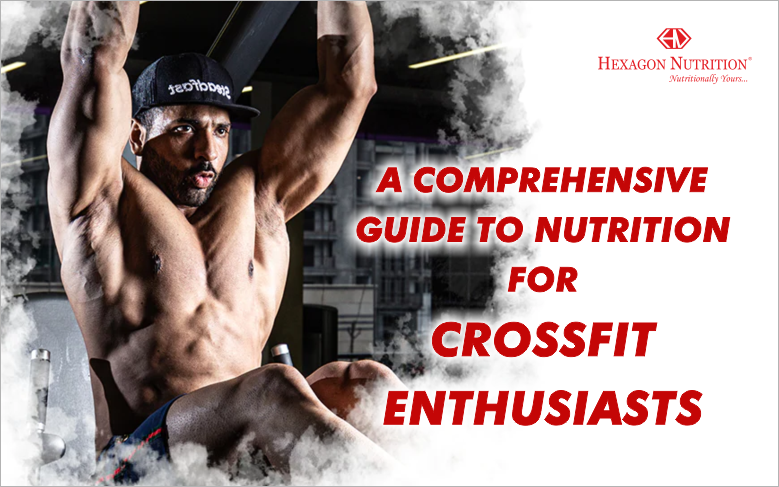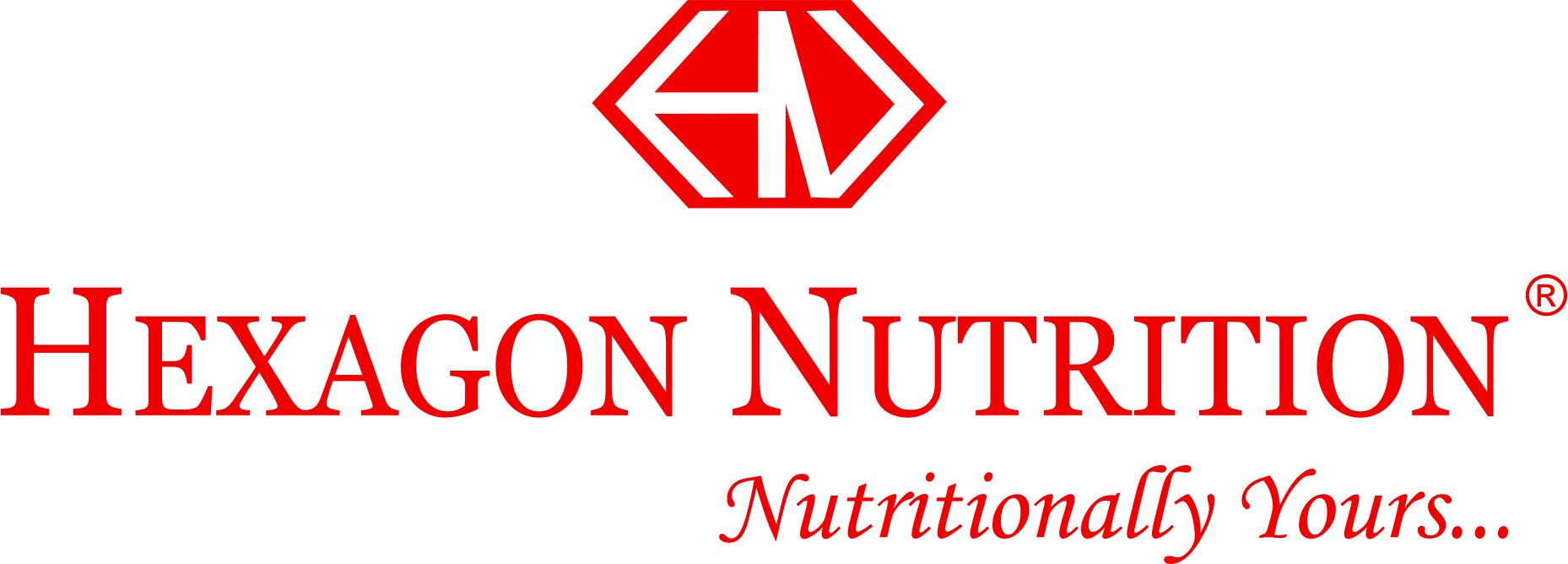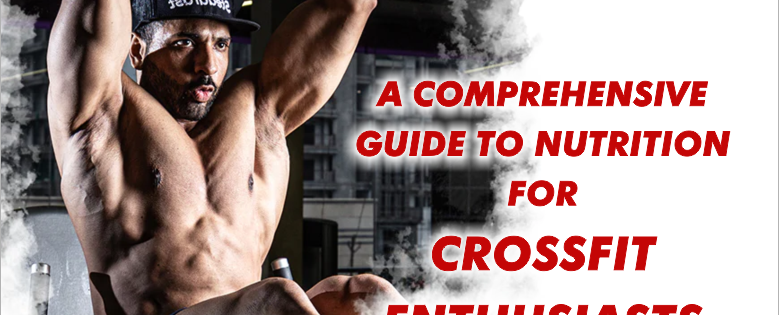Fueling Excellence: A Comprehensive Guide to Nutrition for CrossFit Enthusiasts

Introduction:
CrossFit, a high-intensity fitness program that combines elements of weightlifting, cardiovascular exercise, and gymnastics, demands a unique approach to nutrition. Whether you’re a seasoned CrossFit enthusiast or a beginner looking to optimize your performance, the right nutrition plays a crucial role in achieving your fitness goals. CrossFit is a demanding fitness regimen that places significant stress on the body. While a well-balanced and nutrient-dense diet should be the foundation of any athlete’s nutrition plan, there are instances where supplements can play a beneficial role in supporting the unique needs of Cross Fitters.
Following are the key nutritional principles tailored to the needs of CrossFit athletes.
Prioritize Protein:
Protein is the cornerstone of any athlete’s diet, and CrossFit enthusiasts are no exception. It’s essential for muscle repair and growth, both of which are vital for recovery after intense workouts. Aim to include lean sources of protein such as chicken, fish, lean beef, eggs, and plant-based options like tofu and legumes in each meal. Consider a protein shake post-workout to kick start the recovery process.
Carbohydrates for Energy:
CrossFit workouts are energy-intensive, requiring a significant amount of carbohydrates to fuel your body. Opt for complex carbohydrates like sweet potatoes, quinoa, brown rice, and whole grains. These slow-releasing carbohydrates provide a sustained energy source, helping you power through intense WODs (Workouts of the Day) without experiencing energy crashes.
Healthy Fats:
Include sources of healthy fats in your diet to support overall health and provide a concentrated source of energy. Avocados, nuts, seeds, olive oil, and fatty fish like salmon are excellent choices. These fats also aid in the absorption of fat-soluble vitamins, contributing to better overall nutrient utilization.
Hydration Matters:
Proper hydration is often underestimated but is crucial for optimal performance. CrossFit workouts induce significant sweat loss, leading to potential dehydration. Drink water consistently throughout the day, and consider incorporating electrolyte-rich beverages to replenish lost minerals. Aim to consume at least half your body weight in ounces of water each day, adjusting for activity level and climate.
Meal Timing:
The timing of your meals is crucial for sustaining energy levels and supporting recovery. Eating a balanced meal containing protein, carbohydrates, and fats about 2-3 hours before a workout provides a fuel reservoir. Post-workout, consume a meal or snack with a 3:1 ratio of carbohydrates to protein within the first 30-60 minutes to kick start recovery and replenish glycogen stores.
Supplements for Support:
While whole foods should be the foundation of your nutrition, supplements can be beneficial for filling nutritional gaps, supplements like whey protein for convenient post-workout nutrition, omega-3 fatty acids for joint health, and vitamin D for immune support.
Here are some potential benefits of incorporating supplements as an additional source of nutrition for CrossFit enthusiasts:
- Convenience and Accessibility:
Supplements can provide a convenient and easily accessible source of nutrients, especially for individuals with busy schedules or those who may struggle to meet their nutritional needs through whole foods alone.
- Fast and Efficient Recovery:
Post-workout supplements, such as protein shakes, can be quickly consumed, aiding in the timely delivery of essential amino acids to muscles. This helps to jumpstart the recovery process, reducing muscle soreness and promoting muscle repair and growth.
- Optimizing Macronutrient Ratios:
It can be challenging to achieve the ideal macronutrient ratios through whole foods alone. Protein supplements, for instance, offer a concentrated source of protein without the added fats and carbohydrates, allowing athletes to customize their nutrient intake more precisely.
- Support for Joints and Connective Tissue:
CrossFit features repetitive, high-impact motions that put strain on joints and connective tissues. Supplements containing omega-3 fatty acids, such as fish oil, can improve joint health and reduce inflammation, potentially improving general mobility and lowering the chance of injury.
- Electrolyte Replenishment:
Intense workouts can lead to electrolyte imbalances through sweat loss. Electrolyte supplements can help replenish sodium, potassium, magnesium, and other minerals, aiding in hydration, muscle function, and preventing cramping.
- Vitamin and Mineral Support:
Certain vitamins and minerals play crucial roles in energy metabolism, immune function, and overall health. Supplements can help fill potential nutritional gaps, especially if an athlete’s diet is lacking in specific micronutrients.
- Adaptation to Dietary Restrictions:
Athletes with dietary restrictions, such as vegetarians or vegans, may find it challenging to meet their protein needs solely through whole foods. Plant-based protein supplements can be a valuable addition to ensure an adequate protein intake.
- Pre-Workout Boost:
Some athletes may benefit from pre-workout supplements containing caffeine or other performance-enhancing ingredients. These can help increase alertness, focus, and endurance during training sessions.
- Immune Support:
Intense training can temporarily suppress the immune system. Supplements like vitamin D and zinc may support immune function, helping athletes stay healthy and consistent in their training.
Significance of nutrition for CrossFit athletes:
- Enhanced Energy Levels:
- Supports Muscle Repair and Growth
- Provide energy for Intense Workouts
- Helps with body composition goals
- Improved Endurance and Stamina
- Reduced Inflammation
- Contributes to mental acuity and focus
Conclusion:
Nutrition is a cornerstone of success in CrossFit, providing the energy and nutrients necessary for peak performance and efficient recovery. By prioritizing protein, carbohydrates, healthy fats, hydration, and mind full meal timing, CrossFit athletes can optimize their nutrition to support their fitness goals. Remember, there’s no one-size-fits-all approach, so listen to your body and make adjustments based on your individual needs and preferences. With the right fuel, you’ll be well-equipped to tackle the challenges and achieve new heights in your CrossFit journey. Moreover, the individualized nature of nutrition recognizes that each athlete is unique, and there is no one-size-fits-all approach. Listening to the body’s signals, adjusting nutrition based on personal goals, and being mindful of specific dietary needs are key elements in optimizing the impact of nutrition on CrossFit performance.



